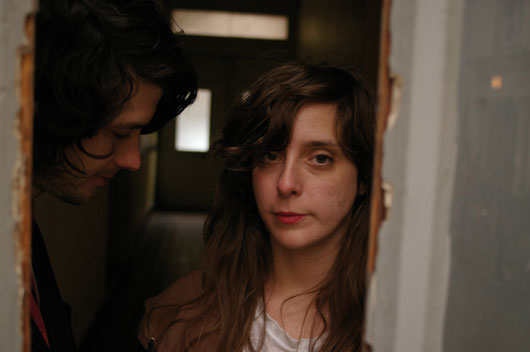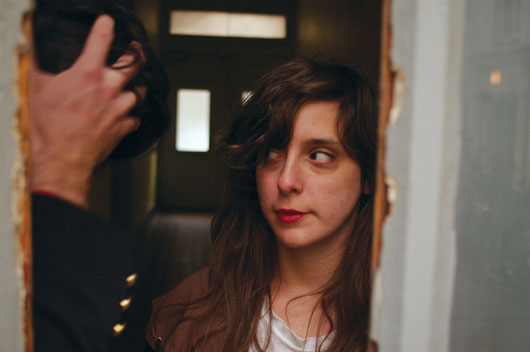Seaside Getaway: With a New Home on Sub Pop, Baltimore’s Beach House Scales Up Their Trademark Sound
Things that immediately establish a certain mood: dead body, Labrador puppy, thunder, Inland Empire, the […]

Seaside Getaway: With a New Home on Sub Pop, Baltimore’s Beach House Scales Up Their Trademark Sound
Things that immediately establish a certain mood: dead body, Labrador puppy, thunder, Inland Empire, the […]

Things that immediately establish a certain mood: dead body, Labrador puppy, thunder, Inland Empire, the band Beach House. Even among three divergent albums, Baltimore’s Victoria Legrand and Alex Scally remain masters of bringing listeners to their very specific place.
It’s not through insular or radically experimental music, necessarily, but via melancholic-pop comfort food—understated yet baroque, ethereal yet immediate. Catchy, even. Call it “dream pop” if you must; this Beach House is indeed a surreal locale. Legrand sings like she’s in a twilight fog—organs wash, keys twinkle as distant stars, submerged drum machines deliver the duo’s unwaveringly languid rhythms.
?Teen Dream, Beach House’s third full-length, is due at the end of January. Their first for Sub Pop, it sets a new high-water mark—their biggest exposure, highest level of production values, and most realized, honed effort yet. “I think our old stuff is really one-dimensional,” offers multi-instrumentalist Alex Scally in a late-fall interview at the duo’s Baltimore warehouse practice space. “We liked it that way, but we were outgrowing it and were really not wanting to play music like that anymore. As we were writing new songs, it was like, ‘This this is the right feeling.’ We were able to make it this multicolor giant feeling.”
LAYING THE FOUNDATION
Perhaps what makes it most remarkable is that Teen Dream marks the third re-imagining of the Beach House sound. In 2006, the band debuted with a self-titled record on Carpark. The album was recorded over two days in Scally’s basement, and it radiates a certain lo-fi-ness, but something much different than the dirty crunch that’s turned a value into a genre in recent years. Rather, it’s an alluring simplicity of sounds and formula, and the sense that whatever is happening in the music is happening at the bottom of a shallow reflecting pool.
The sound was unexpected, and unexpectedly efficient—music from a duo that obviously didn’t need to be anything more than a duo. Legrand’s voice—a Nico-like instrument that lays itself into your headspace like the trace of a cool, gentle finger, replete with its chill—needs little to complement. Slide guitar on the first record, mainly, haunting and delicate, and lyrics that make love (and would-be love) seem like the only thing there is in the world, beckoning in soft tones “hold your hand on me.”
Two years later, the duo released Devotion, also on Carpark. With standouts like “Gila,” “You Came to Me,” and “Heart of Chambers,” the band clarified its vision. Legrand’s voice pushed out of the mix even further, and became both a heavy ballast and arching support for everything else Scally put into the songs, adding even more keys and organ, filling in open spaces with funereal wash. The songs were less about love than places—”Gila,” “Home Again,” “Turtle Island”—within the context of love (or vice versa), in melodies shaped not just for indie pop, but that could fly for straight-up drive-time pop (if that drive time involved a moonlit desert).
“Heart of Chambers”
“It’s really easy to do what you’ve done before,” says Scally. “Sometimes people do it because they don’t know what else to do, how to go forward.” And Beach House does so at the risk of losing fans at each phase of the band’s progression. The things about the earlier records that warmed people to Beach House—do-it-yourself production values and an oddball kind of minimalism and chill—may, to the band, be seen as old limits, but to listeners, they might be hallmarks of a certain beloved sound. It’s the risk any artist takes moving forward but, for a band as singular as Beach House, it seems amplified.
“A lot of the writing on Teen Dream is expanding the same sort of equation [as Devotion and Beach House], but challenging ourselves to build a more fantastical landscape,” says Legrand. “See how far you can push things, make crazier colors.” A fine example, “Used to Be,” saw release last year as a 7-inch, paired with 2006’s “Apple Orchard.” The mournful organ of the original is swapped for piano—turning the tone temperature up on the song by an important degree—and the ending, which originally deconstructed the song into the same metronomic drum pattern that it begins with, is embellished, and even hopeful.
“It wasn’t that we were unhappy with the first version,” explains Legrand. “It was the belief that there were things in the song that were warm and emotional and could be stronger.”
“That song was a huge trial for us,” Scally adds. “When we first made it, we made it in two days. It sounds like a demo, the original. We had to make this song part of the musical world we’re in now, or scratch it. We really loved the song but thought it was going to be left behind. We were hating it forever.”
?AN UPSCALE REMODEL
One of the larger upsides to joining up with Sub Pop was recording money. (“We didn’t want to leave Carpark because we love [label manager] Todd [Hyman] and love working with such a small label,” Scally says.) Not only did that mean working with producer Chris Coady (of TV on the Radio, !!!, and Yeah Yeah Yeahs fame), but it meant isolation and time to get the record exactly right. “[It meant] getting to a place that doesn’t feel claustrophobic, for me personally,” says Legrand. “It helped for the album to, like, be all there was [around us],” adds Scally.
And it was for 25 days in Woodstock, New York, leaving us another record that is radically different than its kin. Teen Dream is, to hear the band tell it, the realization of an aesthetic that the duo’s been attempting for two albums, and falling short of. “We were able to get the sound going through minds,” says Scally. Which is lush and hi-fi, less ethereal, and more “rock band”: the mix is cleaner, which is a powerful change in the Beach House universe; there are live drums, washes of actual human cymbal, and Victoria Legrand’s vocals are more on a pedestal than they’ve ever been—less gazing and more diva.

“Zebra”
“I was always really inspired by Victoria’s singing,” says Scally. “She’s always had the power, but this record really displays [it]. I feel like my job in the band is to ornament her voice, find ways to surround[it]. I found it was just [with] every song she would create these melodies and everything would take off. Everything would keep building up into these giant [musical] towers.
?
“The [songs] always change once you start singing,” he says to Legrand. “It’s always a reaction to the voice that drives it. We would never be able to arrange a song until the voice, its melody, and style were there.”
?
“[It’s] a melody that just appeared,” replies LeGrand. “Like, [floating] at the edge of a beach.”

